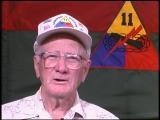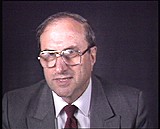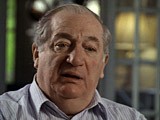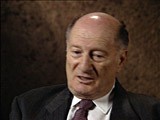
Oral History
Browse an alphabetical list of survivors’ oral histories. These interviews describe firsthand accounts and personal experiences during the Holocaust and World War II.
<< Previous | Displaying results 1-10 of 27 for "Oral History" | Next >>
-
Dallas Peyton describes his recollections of the liberation of Dachau
Oral HistoryDallas Peyton of Tucson, Arizona, was a member of the 70th Armored Infantry. In 1945, with other liberating troops, he entered the Dachau camp and encountered survivors and evidence of atrocities.

-
Darrell Romjue describes how US troops encoutered camps such as Mauthausen
Oral HistoryDarrell Romjue is a veteran of the 11th Armored Division. During the invasion of German-held Austria, in May 1945 the 11th Armored (the "Thunderbolt" division) overran two of the largest Nazi concentration camps in the country: Mauthausen and Gusen.

-
David (Dudi) Bergman describes a roll call "violation" incident in the Reichenbach subcamp of Gross-Rosen
Oral HistoryThe Germans occupied David's town, previously annexed by Hungary, in 1944. David was deported to Auschwitz and, with his father, transported to Plaszow. David was sent to the Gross-Rosen camp and to Reichenbach. He was then among three of 150 in a cattle car who survived transportation to Dachau. He was liberated after a death march from Innsbruck toward the front line of combat between US and German troops.

-
David (Dudi) Bergman describes bar mitzvah during deportation by cattle train from Auschwitz to Plaszow
Oral HistoryThe Germans occupied David's town, previously annexed by Hungary, in 1944. David was deported to Auschwitz and, with his father, transported to Plaszow. David was sent to the Gross-Rosen camp and to Reichenbach. He was then among three of 150 in a cattle car who survived transportation to Dachau. He was liberated after a death march from Innsbruck toward the front line of combat between US and German troops.

-
David (Dudi) Bergman describes being rescued by inmates before he could be taken to the Dachau crematorium
Oral HistoryThe Germans occupied David's town, previously annexed by Hungary, in 1944. David was deported to Auschwitz and, with his father, transported to Plaszow. David was sent to the Gross-Rosen camp and to Reichenbach. He was then among three of 150 in a cattle car who survived transportation to Dachau. He was liberated after a death march from Innsbruck toward the front line of combat between US and German troops.

-
David (Dudi) Bergman describes liberation by US Army in mountains near Innsbruck
Oral HistoryThe Germans occupied David's town, previously annexed by Hungary, in 1944. David was deported to Auschwitz and, with his father, transported to Plaszow. David was sent to the Gross-Rosen camp and to Reichenbach. He was then among three of 150 in a cattle car who survived transportation to Dachau. He was liberated after a death march from Innsbruck toward the front line of combat between US and German troops.

-
David (Dudi) Bergman recalls the importance of work for survival in the Plaszow labor camp
Oral HistoryThe Germans occupied David's town, previously annexed by Hungary, in 1944. David was deported to Auschwitz and, with his father, transported to Plaszow. David was sent to the Gross-Rosen camp and to Reichenbach. He was then among three of 150 in a cattle car who survived transportation to Dachau. He was liberated after a death march from Innsbruck toward the front line of combat between US and German troops.

-
David Levine describes hiding his two-year-old nephew during a roundup of children in the Kovno ghetto
Oral HistoryDavid was born to a middle class Jewish family and attended a Jewish school. In August 1941, after the Germans occupied Kovno, he was forced into the Kovno ghetto, where he shared two rooms with his immediate and extended family. Many members of his extended family were killed during the Great Aktion in Kovno in October 1941. David worked in a forced-labor brigade in the ghetto. In March 1944, he witnessed the Kinder Aktion and was able to save his nephew. During the destruction of the Kovno ghetto, David…

-
David Stoliar describes being the only witness to the fate of the "Struma"
Oral HistoryIn 1936, David moved to Bucharest to live with his father. As Romania came under German influence, Romanian authorities introduced increasingly harsh measures against Jews. Antisemitic agitation increased and Jews came under attack in the streets of Bucharest and in other public places. David's father decided David should leave the country and arranged passage for him to Palestine. In December 1941, David left Romania from Constanta, a port city on the Black Sea, on the "Struma," an old cattle boat. The…

-
David Stoliar describes conditions on board the Struma during the journey to Istanbul
Oral HistoryIn 1936, David moved to Bucharest to live with his father. As Romania came under German influence, Romanian authorities introduced increasingly harsh measures against Jews. Antisemitic agitation increased and Jews came under attack in the streets of Bucharest and in other public places. David's father decided David should leave the country and arranged passage for him to Palestine. In December 1941, David left Romania from Constanta, a port city on the Black Sea, on the Struma, an old cattle boat. The…
